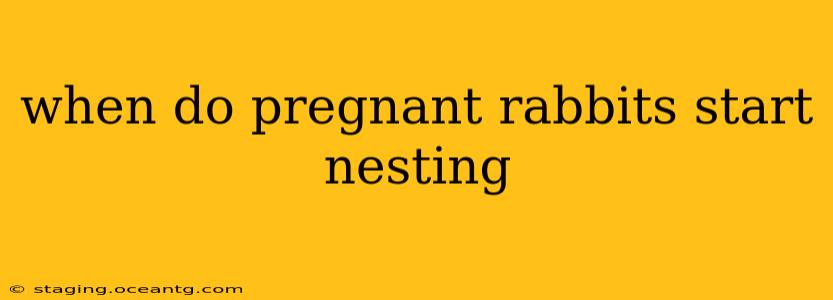Pregnant rabbits, also known as does, are meticulous nest builders, instinctively preparing a safe haven for their kits (baby rabbits). Understanding their nesting behavior is crucial for anyone caring for pregnant rabbits, whether in a breeding program or as a pet owner. This comprehensive guide will delve into the timing of nest construction, the materials used, and other key factors influencing this crucial stage of rabbit reproduction.
How Long Are Rabbits Pregnant?
Before we dive into nesting behavior, it's important to establish a timeline. The gestation period for rabbits is approximately 28-35 days, with an average of 31 days. Knowing this timeframe helps predict when nesting behavior is likely to begin.
When Does Nesting Typically Begin?
Rabbits usually begin constructing their nest around days 25-28 of pregnancy. This is a critical period, and you'll notice several behavioral changes indicating the imminent birth. However, some does may start earlier or later depending on individual factors like stress levels, breed, and environmental conditions.
What are the Signs a Pregnant Rabbit is Nesting?
Several signs indicate a pregnant rabbit is nearing the nesting phase:
- Pulling fur: This is the most prominent sign. The doe will vigorously pull fur from her belly and flanks to line the nest. You might find clumps of fur around her living space.
- Increased nest-building activity: She'll start gathering materials and arranging them into a nest. This might involve rearranging bedding, straw, or other soft materials.
- Increased appetite and water consumption: The doe's body needs extra nutrients to support the growing kits and prepare for nursing.
- Restlessness and seclusion: She might become more withdrawn and spend more time in a secluded area, preparing her nesting spot.
- Nest construction: This is the most definitive sign. The doe will create a deep, cup-shaped nest, usually in a hidden, protected location.
What Materials Do Rabbits Use for Nesting?
Rabbits are surprisingly resourceful nest builders. They utilize various materials, depending on availability:
- Their own fur: This forms the soft lining of the nest, providing insulation and warmth for the kits.
- Straw or hay: These provide structural support and cushioning for the nest.
- Soft bedding: Commercial rabbit bedding or other soft materials can be incorporated into the nest.
- Grass or leaves (in wild rabbits): Wild rabbits may use natural materials available in their environment.
What Should I Do If My Pregnant Rabbit Isn't Nesting?
If your pregnant rabbit is nearing the end of her gestation period and shows no signs of nesting, it's important to consult a veterinarian specializing in rabbits. There might be underlying health issues affecting her nesting instincts. Providing a suitable nesting box with soft bedding can also help encourage nest building.
How Can I Help My Pregnant Rabbit Build a Nest?
Providing a suitable nesting box is generally recommended, particularly for indoor rabbits. This should be a secure, dark, and enclosed space. The box should be large enough to accommodate the doe comfortably and should be filled with plenty of soft bedding materials like straw, hay, and paper towels. Avoid using anything that could be toxic or pose a choking hazard to the kits.
Can I Disturb My Pregnant Rabbit While She's Nesting?
Minimizing disturbance is crucial during the nesting and birthing process. Avoid handling or unnecessarily approaching the doe, especially during the last few days of pregnancy and after the kits are born. Excessive stress can lead to complications.
Understanding a pregnant rabbit's nesting behavior is essential for ensuring a successful and healthy birth. By providing a safe and supportive environment, you can significantly contribute to the well-being of both the mother and her kits. Remember, always consult a veterinarian if you have any concerns about your pregnant rabbit's health or behavior.
